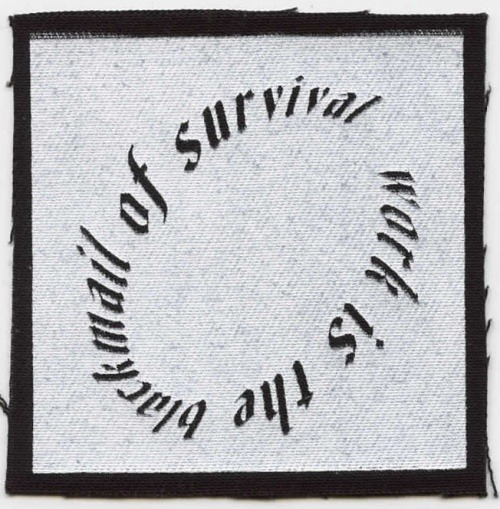#situationism
Text
Identity Situationist Pride Flag

Identity situationism (sexuality, gender, orientation, alignment, presentation, etc.): having different behavior regarding one's identity depending on the situation, sometimes leading to changing self-identification in a situational way.
This idea comes from queercore and homocore movements.
#queercore#homocore#identity situationist#situationism#situational#sexuality#orientation#gender#mod ap#mogai#mogii#flags#liom#identities
44 notes
·
View notes
Photo
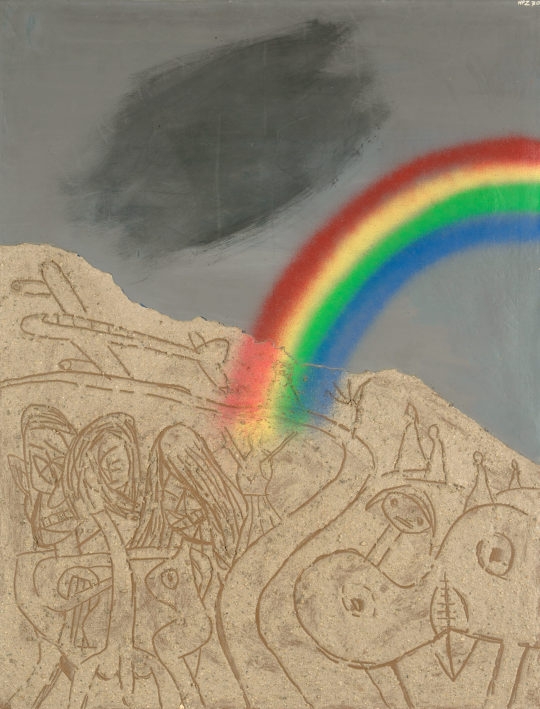
Hans Peter Zimmer (1936-1992) — Emergency Landing [oil, acrylic, spray paint, glue and sand on canvas, 1970]
177 notes
·
View notes
Text
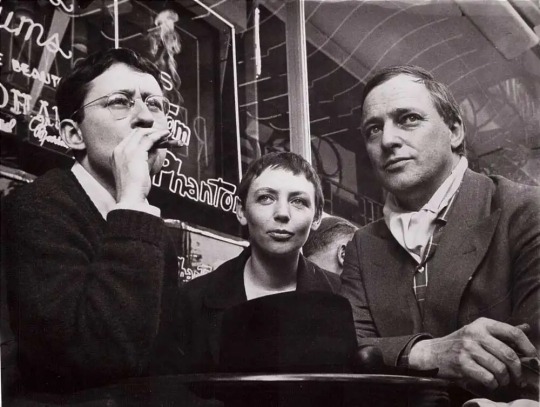
Guy Debord, December 28, 1931 – November 30, 1994.
With fellow founding members of the Situationist International, Michèle Bernstein and Asper Jorn.
45 notes
·
View notes
Text

back by popular demand
Society of the Spectacle (Donald Nicholson-Smith Translation) : Guy Debord : Free Download, Borrow, and Streaming : Internet Archive
#society of the spectacle#situationism#situationist international#guy debord#society#social control#control
37 notes
·
View notes
Text

Andreas Maler from Pentiment is a Situationist!
31 notes
·
View notes
Text
The Soviet Union is gone, the Spanish Revolution failed, and the French uprisings of '68 dissipated. We live in a graveyard of revolutions, and people are arguing about which corpse tastes the sweetest.
#communism#socialism#anarchism#anarchy#Marxism#Soviet Union#Spanish Civil War#France#May 68#Situationism#Situationist International
15 notes
·
View notes
Text
Analysis paralysis hits hard for millennials and gen z, I think. Everything seems so complex, especially when we’re all so *aware* of it all the time, that any small thing we have to do day to day seems pointless, and anything bigger seems impossible to do well enough. “But I worry and I give money and I feel useless behind this computer, and that’s just barely scratched the surface of my mind” - as the great sage of our times, Hayley Williams, tells us.
This is especially bad if we have memories of doing wrong in the past. Whether real or imagined, this can be traumatic, and make being absolutely perfect or else doing nothing at all seem like the only option.
But perfection is impossible. We all know this on some level - there’s simply too much complexity to any problem for us to even learn about all of it within our lifetime, let alone understand it, especially since everything is always developing along with us. Some forethought is often necessary to avoid negligence, especially when addressing bigger problems, and we must always learn from our mistakes to heal from them (which can take some time), but at some point action is necessary - to be there for people, to make some difference, to try. Sometimes that’s the really important thing, even if it doesn’t achieve any of what you tried to achieve - you showed that you cared, and you may inspire others to try too, and together you can achieve more than either could alone.
Accepting imperfection is more than just practically useful though. It means also being more compassionate, accepting that just as you can’t achieve perfection, neither can others - and they may even disagree with you! Just like you might sometimes not even be sure what perfection means to you, and it may be that you need to try something to work it out. You can learn from your failures, sometimes you can learn about past failures through making more, and you can learn from other people’s efforts. Thinking that you could know the answers perfectly, that you need to in order to act, makes it hard to learn from action happening right in front of you.
You don’t need a perfect knowledge of psychology or first aid to comfort and care for someone. You don’t need a perfect knowledge of a subject to write and share some ideas about it (to get meta). You don’t need to perfect knowledge of politics, society, and economics to advocate for or act on behalf of a conviction about how the world should be. Thinking that you ever could is pretty arrogant anyway, and it seems silly when confronted head on, but I do think that so much of despair comes from an implicit belief that we should have perfect knowledge before acting.
There was the beginnings of a revolution in France in 1968, and it failed. The Marxist leadership refused to believe that students could be revolutionary. They failed to see the productive effect they were having, that they were already reaching out to others, and so they refused to support them. They thought that conditions had to be perfect for any change to happen, and so they couldn’t learn from the creativity of the students who were already making a better world. If they had, they may have achieved something like what they said they wanted.
Importantly, when it comes to political questions, we don’t need to be aiming to solve the whole world’s problems at once. That’s too big a problem! No one person can do that, and there’s no group capable of doing it that we could align ourselves with. Start small, solve smaller problems in ways that align with your principles. This does immediate good, but also shows other people (and you) that there are other ways of doing things, and people willing to do them. This builds groups that can address bigger things, and provides a space to learn ways of acting that couldn’t have been imagined before people started trying things. “A theory cannot be developed without encountering a wall, and a praxis is needed to break through.” - Gilles Deleuze
Learning is not a project that can be completed, it’s a frame of mind - being open to a world which will always change and people whose capabilities will always surprise you. Accepting that people, including yourself, will always be different from how you want them to be, and accepting and supporting them in their projects anyway, not when they’re perfect, but when they’re headed in the right direction.
#analysis paralysis#philosophy#politics#anxiety#situationism#may 68#paramore#jacques rancière#communism#marxism#louis althusser#gilles deleuze#climate anxiety#activism
10 notes
·
View notes
Text
It is long political post time, motherfucks
Today's heart attack:
Situationism
Now, I wouldn't be able to determine whether it is a leftwards radicalisation of the anti-consumerist right, if it is a counter-cultural movement to the consumer culture of the post-war economic boom, or if it is a rightwards degeneration of anti-capitalism to fit the Overton window of its time. In doubt, we'll use the prior under the assumption that a counter-cultural movement to consumerism existed before the economic boom and that Situationism is a byproduct of that movement.
So, for the sake of this post, Situationism is, in and of itself, a leftwards radicalisation of the anti-consumerist right in the specific ambits of art, advertisement, and commodity culture with a background of -at least partial- class consciousness.
With the definition out of the way, let's get to the juicy parts:
Situationism and philosophy
Situationism believes that Marx did not concentrate thoroughly enough on the philosophical aspects of capitalism, and -in a way- that may be considered correct, as Marx mainly addressed the practical incoherences and material failures of the capitalist system. Despite that, I would say such a material analysis is intrinsically philosophical.
Capitalism is not evil due to its inconsistencies or failures but for its design and consequences: Both factors are born of the liberal philosophy of the 18th century that gave birth to the concept of modern industrial capitalism. Capitalism is born of philosophy, and -consequently- any critique of capitalism is a critique of the liberal ideas and conception of liberty that moulded it.
I am not trying to say the Situationist analysis of the system of capital is incorrect, but that it is misguided in its interpretation of what capitalism ultimately is. And while the theory of isolation and fulfilment perpetrated by capitalism is correct, it falls entirely within the Marxist perspective of nature and is implicit in the belief that capitalism aims to bend the meaning of the word "humanity" for its goals.
"Situations"
Situations are, according to Situationist literature, "a moment of life concretely and deliberately constructed by the collective organisation of a unitary ambience and a game of events.". In this, we can see the use of dialectical Marxism, as the term "Situation" then started meaning a more general merging of life with art, with the principal example of the Paris Commune as a "Revolutionary Moment".
The concept of Situations, in my eyes, is one of the few entirely good characteristics of Situationism, not necessarily from a political point of view, but a more human one: it allows us to perceive the "Revolutionary moments" not as "Failed Revolutions which the damn anarchists praise" or "Perfect examples of why my specific ideological current is perfect above all others", but as small steps that the leftist movement has historically taken that prove the theory of material conditions and from which we can learn as we wait for the next time those conditions fully develop.
Détournement and "Anti-Capitalism"
In addition to the worldview and theory of Situationism, one must logically analyse its praxis: A praxis funded on an individualistic and artistic approach to small-scale revolution, not to overthrow the system but to reject it. The use of capitalist tactics against the system of capital itself cannot destroy the system but can ridicule it, which is something we can see abundantly on the internet nowadays since even on the right, many people hold anti-corporatist, anti-consumerist, and anti-monopoly beliefs that they turn into Situationist protest through things like memes.
The "Anti-Capitalist" beliefs of the Situationist movement become, through the use of inefficient means of fight, ridicules and critiques that do not affect the system of capital but that make people more prone to understanding the system and its flaws: In this, Situationist praxis becomes not a way to overthrow the system of markets and spectacles, but a way to raise awareness of its incoherences and failures.
Arts and Politics
Another Situationist praxis is the rejection of non-political and bourgeois art and its usage for societal critique and analysis. What do I have to say other than this praxis is a little short of perfect? Arts should be the means people express concerns, ideals, and passions, and they should refer to politics and current events. This type of praxis naturally ties to what I previously stated regarding awareness and class consciousness.
"Work, leisure, and play" and Psychogeography
The concepts of "Work, leisure, and play" and Psychogeography are very similar in nature to the Philosophical critique of Marxism by Situationists, meaning that they are fundamentally Marxist concepts that have been restructured from a different perspective and misunderstood as products of Situationism.
The "Work, leisure, and play" concept is one of the most jarring contradictions of capitalism: it is the same concept Marx talked about concerning the dichotomy of profits and wages under the capitalist system.
Psychogeography can be seen not as a purely Marxist thought but as a shared view of the Communist Left and Centre: the National Ways to Communism. Psychogeography, as such, ends up being nothing more than the theory of the praxis of leftist view, turning into the study of what those ways could be for each psychogeographical group (the nations as defined by Stalin).
Conclusions
To sum up this analysis:
Situationism is a very interesting ideology that does a great deal to bring revolution in people's everyday lives, but its critique of Marxism suppresses its Marxist inspiration. The tendency of the Situationists to both take from Marxism and then criticise it until they express their equal thoughts as separate and unique brings the ideology to artificially moderate itself into protest and a refusal to comply rather than a shot to overthrow the system.
I am all for the revival of the Situationist movement, but -this time- it ought to be openly Marxist and instead of being inspired by it, it must be its direct extension into the arts and the lives of the people.
I'm sorry if it ended a bit more confusing than it began, but I'm tired and in a hurry now.
#communism#marxism#situationist international#situationism#council marxism#socialism#leftism#marxist feminism#marxist theory#analysis#politics
12 notes
·
View notes
Text

1K notes
·
View notes
Text
If I was a utilitarian, I would be a capitalist supporting a future for humanity in pleasure pods as an inhumanized capital expands throughout the cosmos. But I am not a utilitarian. Such a future is not desirable to me. I am a socialist because I value a broader spectrum of human values - happiness and safety, yes, but also struggle and striving, exploration, the sublime and the mysterious, relating with others and the world, and freedom. I reject capitalism and despotism both as ways of stagnation and domestication and death in one form or another for future humans.
2 notes
·
View notes
Photo

Guy Debord’s house at Champot.
Photo: Luc Olivier.
#guy debord#house#champot#luc olivier#situationism#lettrisme#Situationist International#Internationale situationniste#debord
30 notes
·
View notes
Photo
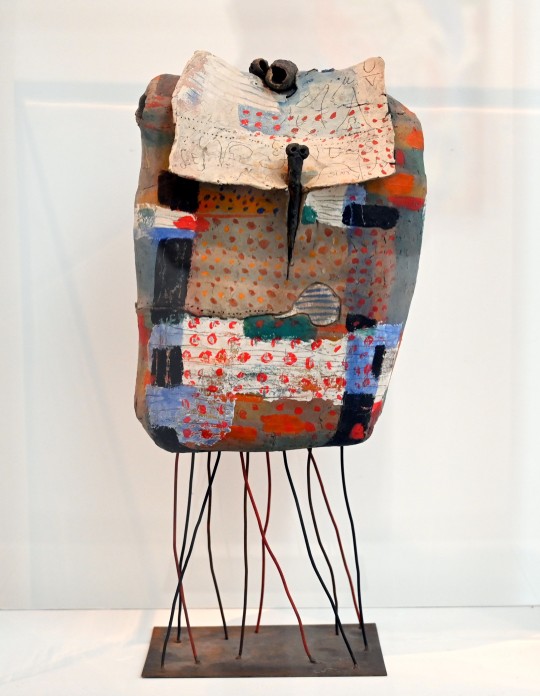
Lothar Fischer (1933-2004) — Black Artist [ceramic clay, gouache, wire, tinware, 1963]
124 notes
·
View notes
Text

«A caress is just a touch
And you touched my heart
And now we're together
You and I will never part»
(Genesis P-Orridge in Psychic Tv - Just Drifting)
2 notes
·
View notes
Text
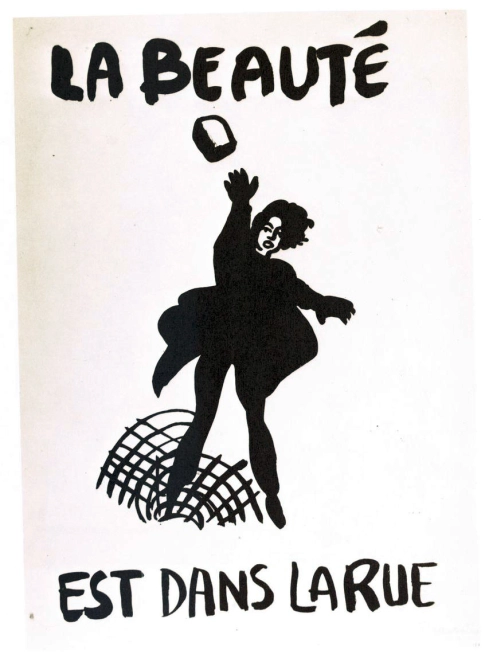
Poster from the Paris '68 uprising.
5 notes
·
View notes

